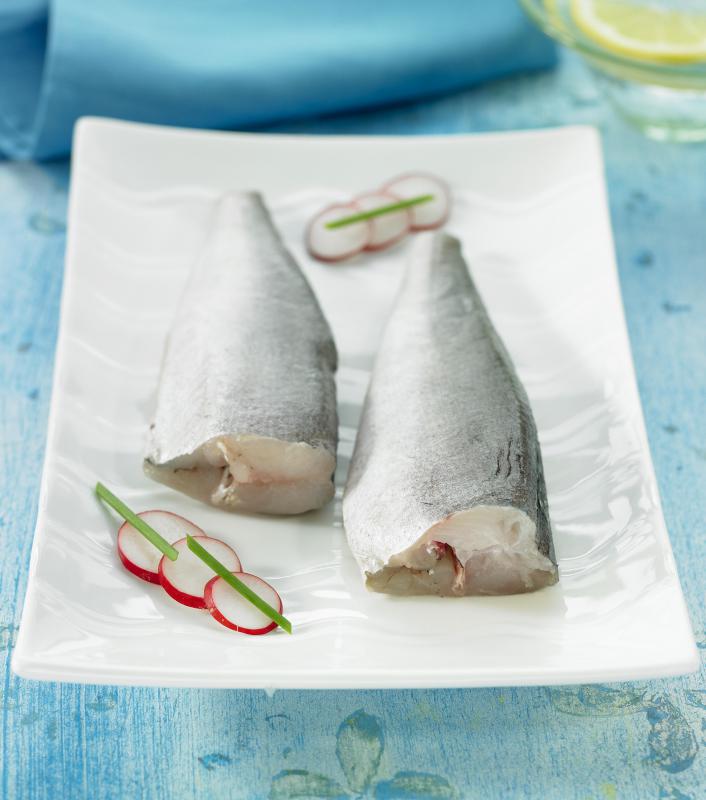At WiseGEEK, we're committed to delivering accurate, trustworthy information. Our expert-authored content is rigorously fact-checked and sourced from credible authorities. Discover how we uphold the highest standards in providing you with reliable knowledge.
Why are Farmed Fish Considered Harmful?
Since fish is considered to be an extremely healthy and beneficial meat, many consumers are encouraged to make it a bigger part of their diet. Increased demand for fish has led to overfishing in many wild fish populations. In response, fish farms have been established, raising fish in enclosed, netted areas. Farmed fish could be seen as a sustainable response to overfishing, but unfortunately, farmed fish may not be as environmentally friendly as it appears. A worldwide debate is raging over farmed fish, making it difficult for consumers to make choices which are beneficial to fish while also including fish in their diets.
There are numerous problems with farmed fish which make them a poor dietary choice, with the exception of certain fish and seafood species. Shellfish such as oysters, for example, have been successfully farmed for decades, and oyster farming actually appears to benefit the marine environment. Certain species like tilapia, sturgeon, and catfish are farmed often farmed sustainably and in an environmentally friendly way.

However, people should avoid purchasing most other farmed fish species. The first concern is with human health. Farmed fish are fed a cheap and standardized diet. This leads to far less nutritional variation than they would receive in the wild, which creates less nutritional value, per pound, than wild fish have. The diet fed to farmed fish is also high in fat, and fat concentrates harmful toxins such as PCBs.

Fishery health is also a major concern with farmed fish. Many farmed fish are fed with fish from South American fisheries, which are rapidly becoming depleted as a result. In addition, non-native species which are farmed can escape, to the detriment of native species in the region. Farmed fish also carry disease and parasites, because they are kept in tightly packed pens. While farmed fish are loaded with antibiotics, wild fish in the region are not, and they can and do get sick.

The marine environment is also heavily impacted by farmed fish. Most fish are relatively inefficient eaters, dropping most of their food to the ocean floor and only digesting a small percentage of what they eat. When fish are kept in a fixed environment, this leads to eutrophication, a concentrated increase in nutrients which ultimately leads to a dead zone. Farmed fish also create other types of pollution, which can be difficult to eliminate, even after the farmed fish are removed from the region.

Seeking out wild caught fish such as albacore, yellowfin tuna, anchovies, bluefish, Pacific cod, crayfish, halibut, sardines, hoki, mahi-mahi, and mackerel is a great way to support sustainable fisheries and fishing practices. Fish such as grouper, orange roughy, Chilean seabass, sharks, bluefin tuna, swordfish, and trawled or dredged species should always be avoided, as many of these fisheries are severely depleted. Trawling and dredging are also very bad for the marine environment. Lobster, crab, sole, and snapper are all considered acceptable to eat, although the fisheries are at risk, and consumers may want to avoid them.
AS FEATURED ON:
AS FEATURED ON:

















Discussion Comments
Anon17052 - No, I think PCB is right here.
PCP or phencyclidine is a white powder that has a mind altering effect. Initially, it was developed as an anesthetic but that practice was stopped because of it's hallucinogenic effects. Still some continued to consume it illegally.
PCBs or polychlorinated biphenyls are chemicals used in industry. In particular, they were ideal for insulating and cooling. In the US and some other countries, PCBs were banned from being imported and produced because of their toxicity. These chemicals have leaked into the environment and caused damage. They are found in soil, air, water, and food.
Surely you mean "harmful toxins such as PCP's - NOT PCB's
Post your comments